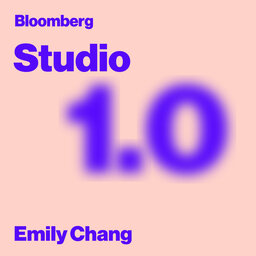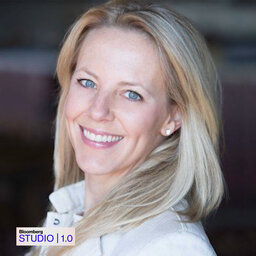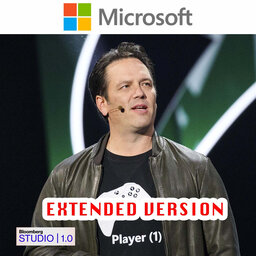(Bloomberg) -- Emily Chang sits down with Mike Judge and Alec Berg, producers of HBO's "Silicon Valley." This episode aired May 21, 2015.
It's a show about a bunch of geeks locked in a house writing code, a most unsexy, un Hollywood premise that's now an HBO hit. The show is named after the world at Lampoon's Silicon Valley. It pokes fun at the absurdities and idiosyncrasies of a place in which a startup can be worth a billion dollars overnight. Behind the show two people who have brought us some of the best satire in entertainment history. Mike Judge of Office Space and Beavis and butt Head fame and Alec Burke, a top writer on Seinfeld, joining me today on Studio one point Oh. Silicon Valley. Creator Mike Judge and executive producer Alec burg thank you so much for joining us. Very excited to have you both, of course, thank you. Well, I'm a big fan. I've seen every episode. I know you've both written, produced directed several different episodes. So what is different about season two, aleck Um, Well, the biggest thing we had to deal with is the loss of Chris Evan Welch, who played Peter Gregory, and he was kind of the cornerstone of season one, and he was the guy that Richards ended up going with financing wise, and that was a huge, huge hole to sort of fill, and just writing wise, it was a big challenge to try and figure out what the hell we're gonna do without him. He was terrific and he's I understand he's being replaced by not necessarily replaced, well, his firm. There's a she becomes the lead partner. This this new character who wasn't in season one, played by Suzanne Cryer, but he's he's it's not necessarily a one for once kind of. I don't know, we don't really think of it as you can replace him with anybody. But yeah, so we had to right around that, and you know, I mean this is kind of this is the second season is the story about what happens to a company. It's them getting going to the next level. Everyone wants to know. Is there a good dick joke in this series? Yeah? I mean that's that is There is at least one. Yeah, I think it's a good one. Is it as dick joke worthy as Look, we love all our babies. What dick joke is better? Or what other dick joke? But seriously, that moment is probably one of the most talked about, if not the most talked about moment of season one, and I feel like it's indicative of how you guys put this show together because it's it's technically correct, and I know you've spent a lot of research on the technical board of things. So so tell me actually about how that came to be. Well, it's when Mike and I first started talking about working on the show. We bonded over the fact that we said, you know what I hate more than anything is technically incorrect dick jokes. So we just decided we vowed from that point for it. If we do dick jokes that are going to be technically correct, It'll be funny, but they will be correct. And Mike, actually, you're an engineer, that's right. You Vy once upon a time yourself actually a little bit about this. Well, yeah, I had had fun on that one. We we we actually believe it or not. This guy beneath Master who's now a pet, he's got his PhD. I think right after we finished season one was sort of our compression consultant, but we asked him for that Dick joke. We had a lot of the our technical stuff about you know, the various angles and whatnot. But he kind of went to town on this and it came out of one of the writers, Matteo borghese his was just completely separately talking about discussion with his roommates about how you could I don't know what you can say on the show Manipulate manipulated four men at the same time, and Alec overheard this and said, I think we've got I think we've got it. That was like my own personal beautiful mind moment. I'm sorry, you know, it's okay, Classics. Really, don't you guys do a lot of research for this show. I know you come up here often. Tell me a little bit about that. A lot of what we are stories just come from real stories that are up here. I think we both had this desire to really just dig in and find out more about the real world, what these people really do. It just kept occurring to us, I don't know what these people are doing. I mean I used to program a little bit, but but I wasn't building apps and platforms. I was doing a different kind of test engineering thing. And so you know, the more we dug into it, the more great stuff we found. And tell me about your time in Silicon Valley. It was a long time ago I was. I worked my first job up here was for a company called Parallax Graphics. They made what would be called a GPU no graphic center faces um, but this was in seven worked there for a few months. I didn't enjoy it too much. I think, like, yeah, well, the movie Office Space was kind of more about why I would leave that job. I don't know, just I wanted to do something else. The hot shows used to be about doctors and lawyers. Why right about Silicon Valley and computer geeks? Now? Like, where does Silicon Valley fit in this arc of entertainment? You don't think these guys are hot? Wells we kind of ask ourselves that on a daily basis, Like why did we decide to do a show that's about people who sit in type all day and what they do literally sixteen hours a day is inherently unfilmable. It's a it's a it's a bit of a challenge. I mean, it couldn't be more irrelevant, right, I mean, like you look at the speed at which hack is moving and the role that it plays in our lives. Yeah, I think hollywoods always been very puzzled about like when the Internet first just exploded and was everywhere. You know. They tried to They did a movie called The Net, and it was trying to make it all sexy and intriguing and and it just it was kind of ridiculous. This was an interesting challenge just because, like Alex says, it is unfilmable. But it's also that challenge I think can lead you to do some more interesting stuff that hasn't been done in television. But so it seems like a good time to take a look at the people who are getting rich off it and building all these things that we use every day. When you ask doctors about crazy anatomy, I feel like they always say, oh god, it's nothing like that. What do you want engineers to say about Silicon Valley? I mean, how important is it to you to get it right? I always like it when they say we've gotten a lot of people saying that we've gotten it right for the most part. Yeah, I mean I think it's two fold. That's what that's what we want. We try and get the technical details right. We do a lot of research, and we have a lot of consultants who ask a lot of questions. But I think it's also just the personality types and uh, you know that that that world. Like, you know, Mike was an engineer, My dad's a biophysicist, My brother is a computer guy. His wife works at Microsoft. Like, I feel like I know those personalities and he knows those personalities. So it's it's really about that, that attitude. I also feel like it's good if we can make the actual people who work in this world actually laugh and really enjoyed on that level, that's good too. So far, it seems like for the most part that's been the case. I mean, there's a few few haters. Well, I have to mention Elon Musk because he did at one point say he told Recode none of those characters were software engineers. Software engineers are more helpful, thoughtful, and smarter. They're weird, but not in the same way. I really feel like Mike Judge has never been to Burning Man, which is Silicon Valley. If you haven't been, you just don't get it. Have you ever been to Burning Man? First of all, that's not the record straight, Okay, so he never write about that. He did though, just last week to light a man on fire, so well that has to count for something. Yeah, you know, one step at a time. But how do you respond to that. Elon Musk is I think is you know, he's at the top of the game here, He's he's not um so he might see things a little differently. I mean, you know, I'm not going to ever say Elon Musk that I know Silicon value better than Elon Musk. We're looking for comedy here, We're not looking to just you know, glorify and put put it all up on a pedestal. Well. Mark Entrieson is a huge fan. Peter Teal another venture capitalist, huge fan, even though he perhaps you may poke fun at him a little bit in in season one with a guy named Peter Gregory. And I know that some of these people you actually talked to on a regular basis. So who did you talk to make sure you were getting it right, to make sure you had geek cred? Oh? Lots of people? Um well, early on, I didn't you know, before this went to series, I didn't have quite the resources. Uh so one of my best friends from high school, his nephew is a top programmer at Google. There's a lawyer we had a connection to who who works with startups. But but once we got going I mean we went to we went all over the place, went to Google, Facebook, Yelp. Like, did Larry and Sergey Mark Zuckerberg were they happy to talk to you? We have not met them yet, No, although we did see we saw that Larry and Sergey were wearing our shirts when they did the ice Bucket Challenge. Yeah, absolutely, in a pipe piper shirt on I wonder, is it at all strange critiquing Silicon Valley from Hollywood, which is its own epicenter of anxiety and ego. I think there were actually a huge number of similarities. We pitch pilots, you know, entrepreneurs pitch startups to seed investors, and we do season one and they do series A. So it feels it feels natural, and there's no shortage of ego or you know, or you know, pompousness in either business. You often hear entrepreneurs and ceo say they're trying to change the world and make the world a better place. What do you think they're doing? Some of them are making the world a better place, not to say Hollywood is better, but um, you know, if I'm sure that like the top people successful people in Hollywood, J. J. Abrams Um Chuck, Lorie, aren't saying, you know, my shows are making the world a better place by making people laugh. For it's you know, you just want to make good stuff. It's a it's a little it's just a different culture. They just have more money up here, that's all. But it's also there's they don't flash their wealth in Silicon Valley the way they do in Hollywood, especially the way they used to, like twenty years ago. Yeah, it is. It's a very interesting code that you can't drive a certain car because it's too pompous, but you can fly fifty of your friends to France for the weekend and have a million dollar party and that's just fine. Burning Man Mike. Here. Movie Idiocracy portrayed of future in which people are getting stupider because everything is so easy and they're so lazy. And now we live in a world where we don't have to drive thanks to Uber, we don't have to cook thanks to Monturi. My groceries get delivered to me by Amazon and instant cart. Are we on a path toward real world idiocracy? Yeah? Probably so. Um, Yeah, I don't know. I mean that that. I wouldn't take that movie too seriously. I was just sort of exaggerating things the way they are. So but I mean, I don't know. Maybe it's making the world a better place, it's not. I like uber who in Tech is a most overdue for lampooning Tom Perkins. It's funny that because there's so much lack time between when we write the show and when it airs. It's almost a full year. We start writing in June and it doesn't come on until April um, so it's you know, ten months from when we start writing to win the shows start to hit air, and so much of what happens that we want to sort of go after happens after we've written the shows, but before we're there it. So it always feels like there's a stock so you're writing history before it happens. Yeah, sometimes we've gotten lucky and we're unlucky, depending on how you look at it. We're we do something in the show, and in between the time we shoot it and it comes out, it's happened in the real world. So what would you like to happen in the real world? Silicon Valley? Like it would power the show for three more seasons. I mean, honestly, just keep doing what you're doing Um, it just seems like, you know, every time we try and make up you know, what's the crazy next thing, the real crazy next thing happens and it's even crazier than what we could make up. So in the next season, all the unicorns are going to blow up and the bubble is going to burst. And yeah, we were talking about that. We'd be taking these meetings and people would be describing deals that happened and how oh this is like I don't know, fifty million users from this app, we're worth this much and we flipped it and so and we found ourselves just god, is there just a giant bubble it's about to burst here somewhere, Like, um, I would like to see the bubble not burst that that wouldn't be good for anybody, but do you think there is. One of the things we wanted to do was make it hard for them to get money to fund this this company, and because that's more compelling. And we kept asking people like, Okay, what are the reasons that they couldn't get ten or fifteen million dollars in funding And most of the people we talked to kept saying, oh, there's no reason. We're like, well, if you had to invent if you made up a reason why, hypothetically so that our show was more interesting, what would that reason be? Oh, no, there's no reason. The show has been criticized for its portrayal of women. Amanda Crew, who plays the only recurring female character up to this point, said, we're not trying to change Silicon Valley. We're trying to be a commentary on Silicon Valley and that's what exists. Do you agree, I mean, we're we're doing satire about it. I mean, it's it's uh. I think if we just came out with the show and it was every company was women men, we kind of be doing a disservice by not calling attention to the fact that it's really seven percent male. And I think VC firms are partners, are mail And one of the guys actually early on that I talked to was this guy Andrew Frame from System Architecture guy on Facebook and so, by the way, there are no women, And I said, so it's still like that. It was like that when I was here. Um, but I mean, if you're not, you know, we're doing satire. I think you've gotta we're taking jabs at them for it. It's different than endorsing it. I think have you even following the ELM Power versus Kleiner Perkins. Yeah, well, in that lawsuits have been folent Facebook and Twitter, and it certainly seems to be I mean, what, what's your take on the sexism issue in Phillipson Valley. It's kind of surprising to me that it that it took this long for anything like this to happen. I mean, it's been male dominated for as long as I mean, I'm I'm old. I was in it, you know, in the eighties. I'm not surprised. I think engineers and this is you know, I'm making a broad statement here, but I think a lot of male engineers have this thing about women that you know, probably goes back to women treating them badly in high school or something, and maybe there's a little bit of that anything that is ripe for satire. Obviously, I think we have a duty to the show too to go after so if we can figure out inspired way to to hit it, absolutely, I wonder how do Silicon Valley compare to the other things that you've done Seinfeld Bevis and butt Head Office Space, King of the Hill Bevis and but they were you know you could. There's no really no overall arc there, so that's different. I've also never done live action television. I've done movies, but um, you got forty crew people standing behind you, and I always have this feeling that like, oh god, what if this thing sucks and they're all snickering back there, going what's he doing? And season one it's like, well, if if we screwed up, nobody will notice. And now I feel like, now that people are watching and that we've gotten a little bit of buzz, now I'm like, well, we can't fail quietly now well. And the entertainment landscape is so fragmented. I mean, it's so certainly, so different from days of Seinfeld and Musty TV on MBC. I wonder it's so different for viewers, How is it different for writers and creators. From the writing side, it doesn't feel much different to me. It's still you gotta do something that you think is really good and you've got to make it as funny as you can, and you can't listen to people who want to make it something that it isn't. One thing that's just different. It's just the nature of HBO is there's just almost no interference from the network. It's it's helpful when they let me give us notes. It's not networks. It's just all kinds of notes and things that you can't say, and very weird standards. I mean, not that I'm always trying to be foul mouthed and vulgar or anything. It's just um doing cable pay cable is just different. I guess yeah. I mean they don't have advertisers, so there's that's a whole heat. Like, they don't have to worry about offending anybody. They don't have to worry about, Oh, we take money from that airline, so we can't mention that airline. What does HBO care about? What do they say they want from you? They said they wanted something that seemed like it was originally that they say, that's you know, that's uniquely yours. You want your own voice, that kind of thing. They've really just it's just been nothing. But you know, let's get you what you want. Would you work for an Amazon Studios? Would you work for Netflix? Sure, not for the next year or two, I'm under contract. But have you been impressed with what they're producing? Well, I think when you're not making that many shows like Amazon Isn't or Netflix Isn't. There's an emphasis on quality, right because they've got to put something out there that people are excited about. And for us, that's the greatest thing in the world. Oh, they want to spend a lot of money on something and their only stipulation is that it has to be really good. Okay, sign me up. So, should like a Comcast be worried? Probably, if I guess, they should be worried. If they're not worried, they should be. And I'm sure that who knows. So what's next for you guys? I mean, is this it? Are you guys? Are you having fun? How long do you want to keep doing this show? Well, it's funny when when we wrap the shoot, we we write for four or five months, and then we shoot for about four months, and then we edit for another three or four months, and then it's basically time to start writing again. So when we wrapped the show, everyone on the crew, there's this thing that goes around the crew the last couple of days of people going so you got the next gig lined up? What are you doing next? And everyone always asks us that and the answers I was like, what are you working on next? I'm working on this, and then when I'm done working on this, I'm gonna start working on this again. So there is no there's nothing else at this point. I mean, it's like two weeks off. It's embarrassing that it takes us as long as it does to do ten episodes of this jerky show, but that's the reality. It takes a year. Yeah, it's weird. This is more like doing three movies in a year. That's what it feels like. Um, but it's ten episodes. That's I don't know. It seems like it should feel easier, be easier, but it's it's not. But I love doing it. So when do you have to start thinking about season three? June? We may be gathering materialized we speak, okay, I think we had a good spit up moment be written into season three. Season three of the Season of the Spit Take All right, Mike, Judge and Alick Bird, thank you so much for joining us.
 Studio 1.0
Studio 1.0


